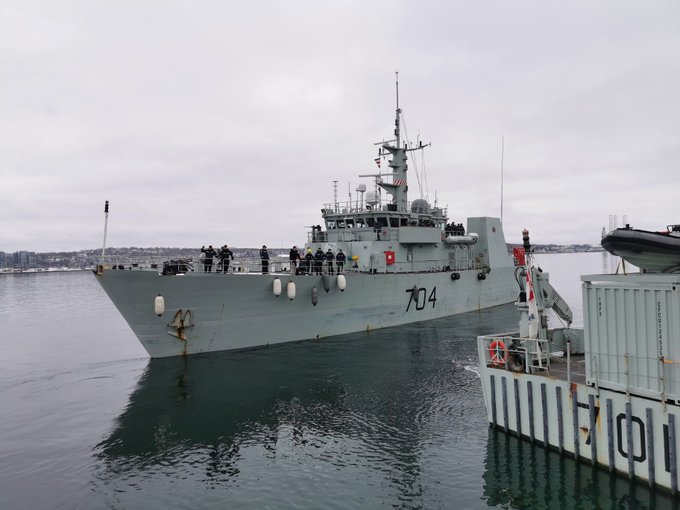Two Royal Canadian Navy vessels, HMCS Shawinigan and HMCS Glace Bay, arrived back in Halifax on Thursday after the trips were cut short as a result of the COVID-19 pandemic.

Both Kingston-class coastal defence vessels had departed Halifax in January for Africa on a four-month deployment as part of Operation PROJECTION.
They were meant to take part in a pair of exercises, Obangame Express and Phoenix Express, working to strengthen relationships with allies and connect with communities in Africa.
Both of those exercises, however, were cancelled in the wake of the COVID-19 outbreak.
Sailors aboard both vessels are considered to be free of COVID-19 as a result of their lengthy trip home.

The crews will remain at sea in Halifax Harbour as the Canadian Armed Forces prepare for Operation LASER, the army’s response to the COVID-19 pandemic, if required.

Get weekly health news
In a note published online Wednesday, the commander of the Royal Canadian Navy, Vice-Admiral Art McDonald, described remaining at sea despite returning to Canadian waters as “unique.”
“It also makes it particularly difficult for your families, whose routine daily and considerable sacrifice to enable your service at sea is magnified in these unprecedented times,” said Vice-Admiral McDonald, thanking the sailors and their families for their sacrifices.
Questions about COVID-19? Here are some things you need to know:
Health officials caution against all international travel. Returning travellers are legally obligated to self-isolate for 14 days, beginning March 26, in case they develop symptoms and to prevent spreading the virus to others. Some provinces and territories have also implemented additional recommendations or enforcement measures to ensure those returning to the area self-isolate.
Symptoms can include fever, cough and difficulty breathing — very similar to a cold or flu. Some people can develop a more severe illness. People most at risk of this include older adults and people with severe chronic medical conditions like heart, lung or kidney disease. If you develop symptoms, contact public health authorities.
To prevent the virus from spreading, experts recommend frequent handwashing and coughing into your sleeve. They also recommend minimizing contact with others, staying home as much as possible and maintaining a distance of two metres from other people if you go out.
For full COVID-19 coverage from Global News, click here.
- Trump slams Canada as U.S. House passes symbolic vote to end tariffs
- Tumbler Ridge B.C. mass shooting: What we know about the victims
- ‘We now have to figure out how to live life without her’: Mother of Tumbler Ridge shooting victim speaks
- Carney, federal party leaders to attend Tumbler Ridge shooting vigil Friday









Comments
Want to discuss? Please read our Commenting Policy first.